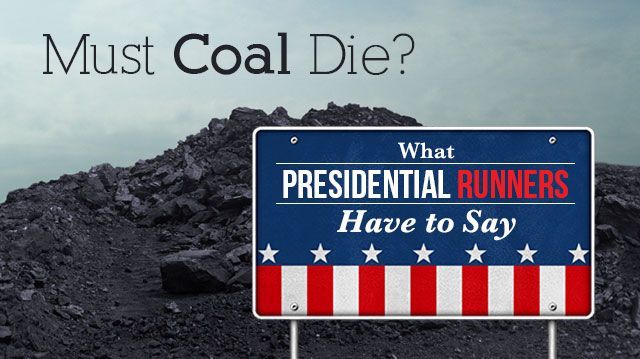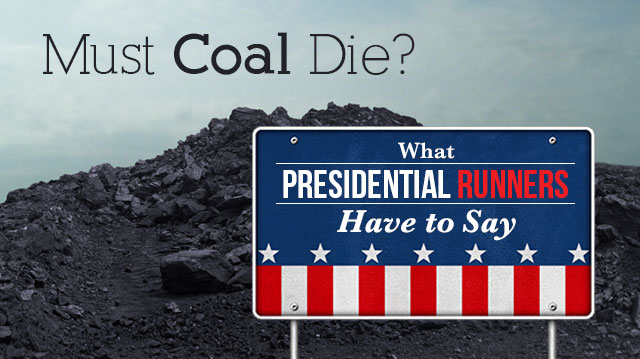
Coal mining dates back thousands of years, and coal continues to be utilized for power generation. More recently, numerous environmental groups have raised concerns regarding the impact of coal power on the environment. From air pollution and heavy metal exposure to greenhouse gas emissions, it is time to abandon this unsustainable power source.
Of course, the environment and our health are not independent of one another — from the food and water we consume to the air we breath. Climate change and pollution are affecting us all. With this year’s upcoming election, many are interested in possible changes — changes that would have a dramatic, positive effect on both the environment and our health.
Coal: a nonrenewable source with serious implications
Earlier this year, a woman from Uniontown, Alabama, approached the U.S. Commission on Civil Rights in Washington, D.C. She raised concerns about coal ash — a harmful byproduct of coal burning. Consisting of lead, arsenic, mercury and other toxic substances, this waste is being deposited near low-income, minority communities.
These communities are being directly exposed to coal ash from landfills, causing a number of health issues. The waste is often left in uncovered ponds, allowing toxins and heavy metals to seep into the groundwater, while lighter particles blow into residential areas. Based on related data, it is said that residents living near these toxic pits have as much as a one in 50 chance of developing cancer due to contaminated water.
Exclusive: North Carolina Coal Ash Pond Spills Into Drinking Water
Many Americans are not even aware of these coal ash landfills, even though more than 1,000 currently exist across the country. Deposits at approximately 200 locations have resulted in spills, which have contaminated the surrounding area’s drinking water and air. Since most sites are not monitored, contamination often goes undetected.
Although the use of coal has slowed down in the U.S., American coal-fired power plants are still using as much as 130 million tons of coal per year. Coal burning emits sulfur dioxide, nitrogen oxides, and other toxic particulate matter. Respiratory issues can develop due to polluted air, and our drinking water can become contaminated with several toxic substances: boron harms reproductive health; arsenic increases rates of cancer; and heavy metals cause a wide range of health and developmental issues.
The solution? Enclosed, secure landfills that do not allow for toxins to leach into the water or air. Better yet, eliminate the use of coal. Although many believe that it can’t be done, it can. In fact, in 2015, Costa Rica met all of its national power needs using only renewable energy for 75 straight days.
In Denmark, in one day last July, 140 percent of the nation’s power demand was generated through wind power alone. Now, Sweden is aiming to become the world’s first nation to end its dependence on fossil fuels, focusing solely on renewable energy. Is this something the United States could also implement?
What future does coal have in America?
The United States coal industry is falling apart, as numerous mining companies have declared bankruptcy. In terms of the miners’ livelihoods, yes, it’s a shame that workers are losing their jobs. However, this is something that needs to be done. Coal is significantly affecting wildlife, climate change, and human health.
An effective plan could be put into place to compensate workers and help them find new work, whereas strategies to counteract the damaging effects of coal aren’t as simple. So, which way will the coal industry go? What are some of the key viewpoints presented by a portion of the remaining presidential candidates?
The Democrats
Clinton — Hillary has a plan to save the coal community, even though the industry is dying and essentially poisoning the planet. Clinton aims to spend $30 billion on infrastructure, business investments, training, and other related incentives.
Sanders — Bernie Sanders is the most eco-conscious candidate. He has a fairly honest and clean track record in terms of environmentalism. Not only does he want to end America’s dependence on coal, but oil and nuclear energy as well. He is planning to ban fracking, and he’s ready for a fossil fuel revolution — taking on these powerful companies in order to transition towards cleaner energy sources.
The Republicans
 Carson — Ben Carson aims to support the coal industry, focusing on jobs and the economy. He has stated that, “a lot of advances have been made towards cleaner coal technology,” which he wants to apply. Although he is not against clean energy, he wants to utilize all available energy sources. He’s most certainly not a front-runner in terms of climate change policies.
Carson — Ben Carson aims to support the coal industry, focusing on jobs and the economy. He has stated that, “a lot of advances have been made towards cleaner coal technology,” which he wants to apply. Although he is not against clean energy, he wants to utilize all available energy sources. He’s most certainly not a front-runner in terms of climate change policies.
Cruz — Recently, Ted Cruz spoke out, letting coal miners know that “help is on the way.” He plans to implement a legislation known as the American Energy Renaissance Act, which would lift federal barriers to natural resource development, as well as the war on coal. He plans to reverse some of the “damage” the Obama administration has caused within the coal industry.
Rubio — Marco Rubio has stated that humans have played a role in climate change, accepting the scientific consensus. With that being said, he has provided little or no support for legislation that encourages the transition towards cleaner energy, such as solar and wind power. Overall, he supports the use of fossil fuels.
Trump — The most vocal of them all, Donald Trump is not one to support advances in environmental and climate change policies. He has focused on jobs and the economy, as well as America’s independence in terms of energy production. He continues to discount the negative impacts of oil, natural gas and coal.
We need to actively pursue renewable energy sources, without relying on coal-based power generation. If a coal-fired power plant is being developed in your community, it’s important to voice your concerns. A comment period will be held, as well as public hearings so that you can voice your opinion. For more information on coal use and its negative impact, please visit the Union of Concerned Scientists.
—Krista Hillis
Krista Hillis is passionate about nutrition, mental health, and sustainable practices. She has her Bachelors in Psychology and Neuroscience and is still active in her research. Studying both the body and mind, she focuses on natural health and balance. Krista enjoys writing based on her ability to inspire others and increase overall awareness.
Sources:
Andrews, R. (2015). “Sweden Plans to Become World’s First Fossil Fuel-Free Nation.” IFL Science. Retrieved from http://www.iflscience.com/environment/sweden-combats-climate-change-aiming-be-fossil-fuel-free-nation
Lurie, J. (2016). “Weird Ailments, Toxic Water, Dismissive Officials—and No, This Isn’t Flint.” Mother Jones. Retrieved from http://www.motherjones.com/environment/2016/02/environmental-racism-coal-ash-explainer

